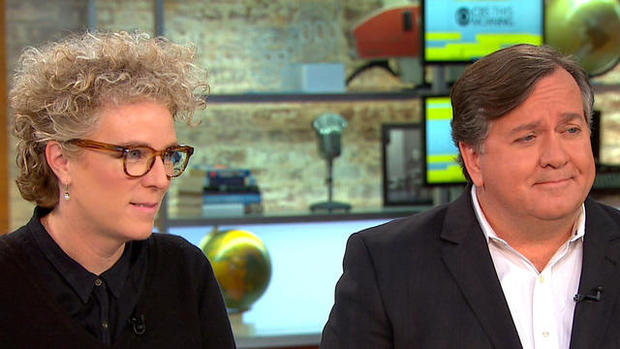NY Times reporter on finding Trump's tax records in mailbox: "We couldn't believe it"
When New York Times reporter Susanne Craig discovered copies of Donald Trump’s tax documents in her office mailbox, she was in disbelief.
“I’m just sort of staring at it, going, ‘This can’t be true.’ And I was on a phone call. I hung up from the person I was talking to and I walked over to [David Barstow’s] desk, who was on the phone, and I showed it to him,” Craig said Monday on “CBS This Morning.” “He just hung up the phone, and we just went into a room and just started looking at them. And it was both like we couldn’t believe it, and also, we need to figure out if we can verify it at the same time.”
There were three leaked pages of the Republican presidential nominee’s tax returns from 1995 showing a $916 million loss, “a tax deduction so substantial it could have allowed him to legally avoid paying any federal income taxes for up to 18 years,” the New York Times reported.
She wasn’t sure why the documents were sent to her specifically.
“I’ve been covering Donald Trump’s finances, and I covered Wall Street, but -- I really don’t know. I don’t know why they selected me out of any reporter in the country. And I was thinking, maybe a lot of other reporters got it and just don’t check their mailboxes, so,” Craig said, laughing.
Barstow, a senior writer at the Times, tracked down Jack Mitnick, the lawyer and accountant who had signed the tax form. According to the Times, Mitnick had handled Trump’s taxes for more than 30 years until 1996.
“This one I wanted to go and sit down face-to-face with him. I wanted to show the documents to him,” Barstow said.
Barstow ultimately persuaded Mitnick to sit down with him at a bagel shop Florida.
“I then had the opportunity to really stress test the documents with him. There were all kind of things about these documents that we were concerned about. … So what we did was we went through all the things that made us doubt or be skeptical of these documents, sort of one-by-one with him.” Barstow said.
One of the concerns that “terribly bothered” the team was how the numbers appeared on the form.
“So this is a huge number, right? $916 million loss. But the nine and the one were a slightly different font and they were slightly misaligned with the other seven digits. It made us worried that perhaps somebody had just added these digits and then sent us these documents,” Barstow said.
But Mitnick told Barstow that the tax software program he had used at the time prevented him from printing a nine-figure loss, so he used a typewriter to manually write in “-91” for the “-915,729,293” figure in Line 18 of the tax document, showing the federal adjusted gross income.
“[Mitnick] of course was a very careful man,” Barstow said. “He was obviously deeply aware of his ethical requirements not to divulge information directly connected to Mr. Trump’s finances, but what he was willing to do, and it was the thing that we really needed him to do, was to authenticate the documents.”
The Times also hired tax experts to analyze the documents.
“The tax experts who we consulted on this, their basic point to us is that there are these wonderful provisions in the tax codes, that for folks who, like Mr. Trump, who put their wealth into partnerships as corporations, LLCs -- it gives this sort of mechanism ... for allowing the losses, depreciation, etc., to flow from those entities right onto his personal income taxes,” Barstow said.
While Trump neither denied nor confirmed the Times’ report, Craig wrote that he “threatened us with legal action if we were to publish them.” After the article was published, the Trump campaign released a statement saying the documents were “illegally obtained.”
“Mr. Trump has paid hundreds of millions of dollars in property taxes, sales and excise taxes, real estate taxes, city taxes, state taxes, employee taxes and federal taxes, along with very substantial charitable contributions. Mr. Trump knows the tax code far better than anyone who has ever run for president and he is the only one that knows how to fix it,” the statement said.
When asked whether the New York Times was concerned about legal action, Barstow responded, “It’s a very well understood principal in our journalistic tradition in this country that if we didn’t entice someone to break the law, if someone mails documents to us, and we think they’re in the public interest, that we have every right under the First Amendment to publish that information.”
